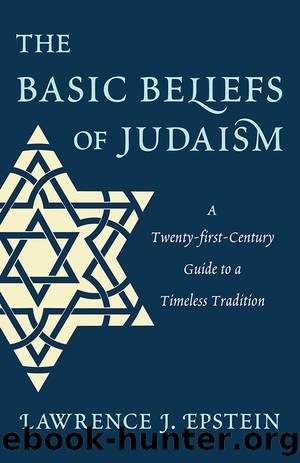The Basic Beliefs of Judaism by Lawrence J. Epstein

Author:Lawrence J. Epstein [Epstein, Lawrence J.]
Language: eng
Format: epub
Publisher: Jason Aronson, Inc.
Published: 2013-01-15T00:00:00+00:00
Covenant
The narrative of Godâs covenant with the Jewish people began with Godâs choosing Jews to serve as messengers of the holy teachings. The next step was the revelation of those teachings, either as traditionally understood through the Torah or through the prophets and later individual revelation or through not revelation but human inspiration. In the latter case, the Torah and other crucial Jewish texts were not revealed in any way and are therefore human creations, though perhaps separated from normal human creativity by the subject matter and the perception that the material emanated from an emotion, inspiration, that propelled an unsurpassed human creation. The Torah is the living embodiment between God and the Jewish people. That doesnât mean it is the literal word of God, but the way the Jewish people at the time understood and expressed both Godâs will and their own personal and communal missions.
Whether by revelation or inspiration, the Jewish people believed they had some kind of divine encounter and voluntarily had entered into a relationship with God.
In Exodus 19:3â6, God speaks to Moses telling him to offer a covenant to the Israelites. The Israelites, according to the terms of this agreement, will follow the laws of the Torah. That is, Halakhah, Jewish law, includes the full legal obligations incumbent upon Jews as given by God, at least as Jewish scholars understand and interpret them. In return the Israelites would be considered a treasured people. The Israelites accepted, and the revelation occurred three days later. God appeared before all the people and spoke the Ten Commandments to them. What is particularly interesting about the commandments is that only the first four seem aimed particularly at the Israelites. The final six are universal, indicating that the message was not meant just for one small people. After the revelation to all the people, Moses ascended into the darkness to receive more of Godâs law before returning and telling the people. The covenant was then ratified and Moses ordered that twelve pillars and an altar be erected.
The covenant at Sinai was not the first biblical covenant. It was an expansion, and a renewal, of the covenant God had made with Abraham. But the very transformation of the covenant and revelation from one person to an entire people was unique in human history. From an American perspective, one steeped in individualism and self-reliance, it is easy to miss the full implications of the revelation being given to the whole people. Such a revelation moves the moral and legal responsibility from individuals to the people to obey the rules God revealed. Additionally, it is crucial not to reduce the revelation to a series of rules about, for example, keeping the Sabbath or following dietary restrictions. The revelation was not simply about the practices required for worship. The revelation included a substantial number of moral regulations making good behavior obligatory. These moral rules extended far beyond the usual borders of religious regulation. They included rules for individuals as members of a social order.
Download
This site does not store any files on its server. We only index and link to content provided by other sites. Please contact the content providers to delete copyright contents if any and email us, we'll remove relevant links or contents immediately.
| Haggadah | Hasidism |
| History | Holidays |
| Jewish Life | Kabbalah & Mysticism |
| Law | Movements |
| Prayerbooks | Sacred Writings |
| Sermons | Theology |
| Women & Judaism |
The Power of Habit by Charles Duhigg(3130)
Man's Search for Meaning by Viktor E. Frankl(2670)
Mckeown, Greg - Essentialism: The Disciplined Pursuit of Less by Mckeown Greg(2440)
MOSES THE EGYPTIAN by Jan Assmann(2412)
Devil, The by Almond Philip C(2325)
The Complete Dead Sea Scrolls in English (7th Edition) (Penguin Classics) by Geza Vermes(2277)
Unbound by Arlene Stein(2268)
I Capture the Castle by Dodie Smith(2034)
Schindler's Ark by Thomas Keneally(1879)
The Invisible Wall by Harry Bernstein(1799)
The Gnostic Gospel of St. Thomas by Tau Malachi(1794)
The Bible Doesn't Say That by Dr. Joel M. Hoffman(1677)
The Secret Doctrine of the Kabbalah by Leonora Leet(1607)
Political Theology by Carl Schmitt(1579)
The Jewish State by Theodor Herzl(1533)
A History of the Jews by Max I. Dimont(1529)
The Dead Sea Scrolls Bible by Martin G. Abegg(1513)
The Book of Separation by Tova Mirvis(1485)
Oy!: The Ultimate Book of Jewish Jokes by David Minkoff(1369)
